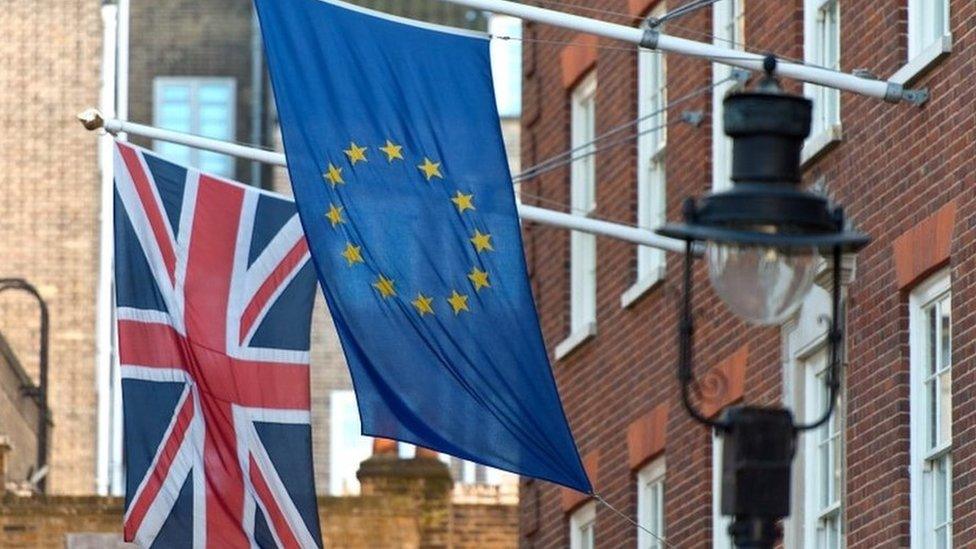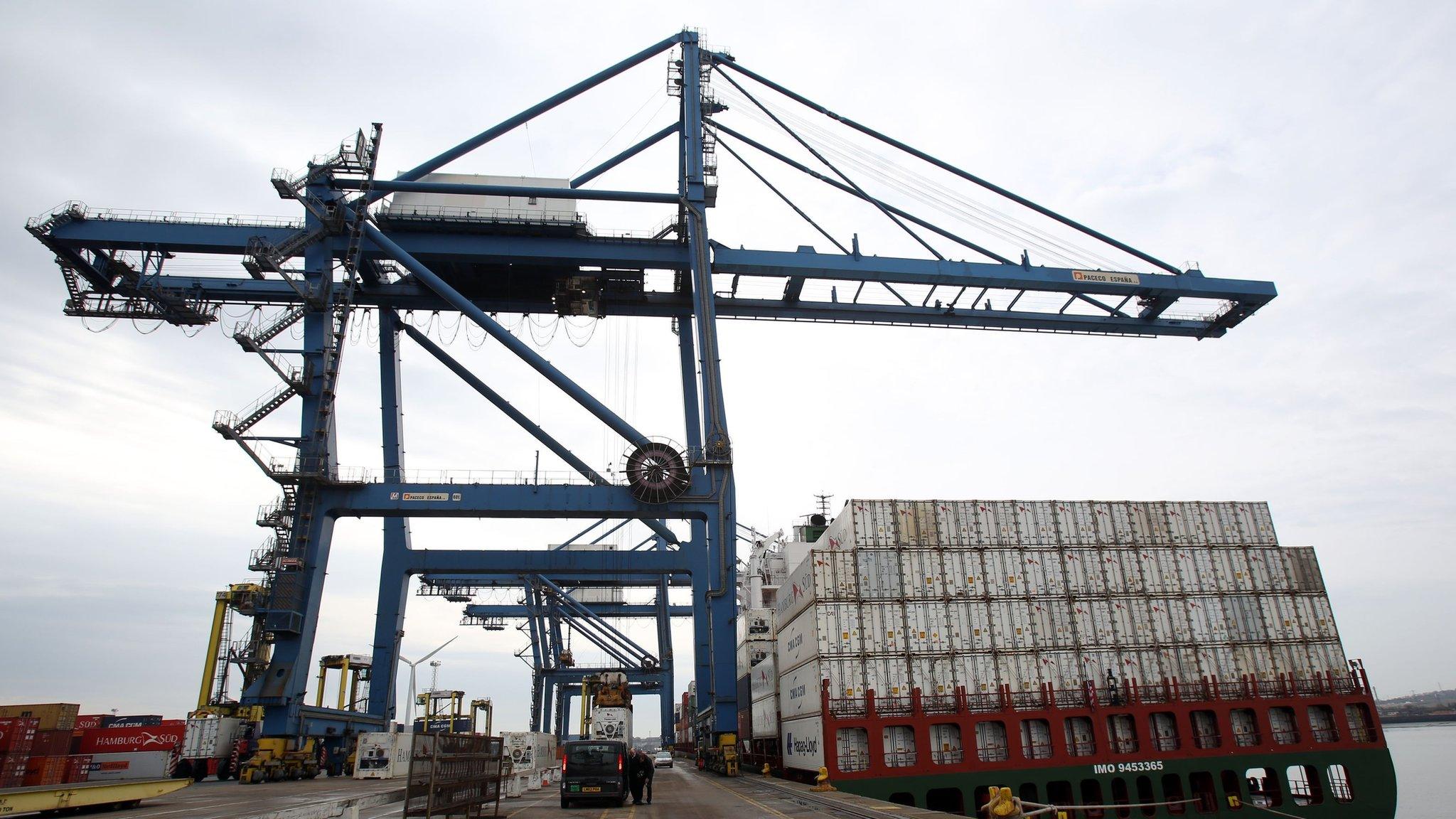Brexit: Will EU bodies be staying in London or going?
- Published

Some EU officials are likely to remain in the UK come what may
It is not just the UK's future in Europe at stake in the forthcoming Brexit negotiations. The EU also has a large footprint in the UK, which could be about to get a little smaller in the next few years.
There has been plenty of speculation about whether the UK will remain in the single market or the customs union, what will happen to EU subsidies for key industries such as farming and fishing and whether the UK will remain a part of valued EU-wide educational and scientific programmes such as Erasmus and Horizon.
All this will be subject to negotiation over the next couple of years.
But what about the future of EU agencies and other EU-funded bodies actually based in the UK? In their cases, there could be a much quicker shakedown.
Of the EU's seven institutions, the European Commission is the one with a major organisational presence in the UK.
Its central London headquarters, based in the former Conservative Central Office building, co-ordinates its activity in the UK - while there are also offices in Edinburgh, Belfast and Cardiff.
Approximately 35 staff, who also represent the European Parliament, play an important role in reporting back to Brussels on political developments in the UK, explaining EU policies to the media, business and public and acting as the commission's voice.
Will any of this be needed after Brexit? At first glance, it might seem unlikely, but the reality is that whatever happens, the UK and EU will retain a close relationship. The EU will remain the UK's largest trading partner by some way - for the foreseeable future at least.

Bearing this in mind, it seems unthinkable that there will be no official links between two.
The EU has diplomatic missions in the US, China and many other major economies where their officials have full ambassadorial status, working alongside counterparts from leading EU nations. This is a model that could be adopted in the UK after Brexit.
But the future for the EU's two UK-based agencies - among 40 powerful executive and regulatory bodies dotted across Europe - is much less certain.
The European Medicines Agency (EMA) and the European Banking Authority (EBA) are legal entities in their own right, set up to perform specific tasks under EU law.
Their staff are generally highly skilled, well-paid and prized elsewhere.
'Bad things'
Responsible for evaluating applications to market new drugs, facilitating access to treatments and monitoring the safety of products, the EMA has been located in the UK since 1995.
But, following the UK's vote to leave the European Union, countries including Sweden, Spain, Denmark and Ireland are among those reported to be keen on luring the organisation and its 890 staff to their shores.
Its executive director, Guido Rasi, told the Financial Times, external that the uncertainty surrounding its future after Brexit had led to "all the bad things you might expect" including increased turnover of staff and reduced interest in vacancies.
While the decision on whether to move could hinge on the deal negotiated by the UK, he suggested any upheaval would have an impact on Europe's pharmaceutical and biotech sector, including British companies.

"If we are losing expertise, we have to focus on managerial things, HR issues," he said.
"Of course our capacity and commitment to provide additional support to this community would be decreased and that would make a fragmented Europe in terms of pricing and enforcement."
If the head of the EBA is to be believed, a decision on the banking regulator's headquarters is already settled.
The week before June's referendum, its chairman, Andrea Enria, told the German newspaper Welt am Sonntag that the regulator would move to another European capital in the event of a Leave vote.
Any such shift would have to be approved by all EU members - including the UK while it is still in the union - so it might conceivably not happen straight away.
The European Commission has said no decision, let alone discussion, about the future of its agencies will take place until official talks about Brexit begin - expected this Spring.
'Soft Brexit'
But the fact one of the EBA's principal goals is to create a single rulebook for financial institutions across the EU would seemingly make it hard for it to remain where it is.
Professor Rosa Lastra, Chair in International Financial and Monetary Law at Queen Mary University of London, says it is "a given" that the agency will have to find a new home.
"The only way to keep the EBA in London is for the UK to remain in the single market, via some form of soft Brexit, which appears to be opposed by the government," she says.

June's Leave vote has set off a veiled bidding war to host the EBA, with Paris, Frankfurt, Milan, Warsaw, Luxembourg and Stockholm all rumoured to be interested in attracting the regulator, set up in 2011 in the wake of the banking crisis.
Although the agency is relatively small by European standards, it is growing in size - its budget rose by 20% to £38m this year - and its loss could be keenly felt by the City.
"When it moves, the City will lose the opportunity to influence rule-making in the single market in financial services," Prof Lastra, who has advised the House of Lords, among other British institutions, on financial regulation.
"Whether or not that will affect the City's status as Europe's pre-eminent financial centre - and one of the world's - will depend on the negotiations once Article 50 is triggered and on the model of trading in financial services that finally gets adopted."
One multinational organisation that is definitely staying put in London is the European Bank for Reconstruction and Development, created in 1991 to help former Communist nations of Central and Eastern Europe, the Baltics and the Caucuses build fledgling market economies and replace their ageing infrastructure.
Although the EBRD - which counts the EU and European Investment Bank among some of its largest shareholders - has increasingly chosen to locate staff in client countries, it says there has been no thought about moving its headquarters from London, either to the Continent or elsewhere.
"We are not an EU institution but an international organisation with more than 60 countries as shareholders which include, alongside the EU 28, the United States, Japan, Canada and many others," said a spokesman.
"There is no discussion about relocating the bank outside of London post-Brexit."
- Published30 December 2020

- Published15 December 2016

- Published4 January 2017
